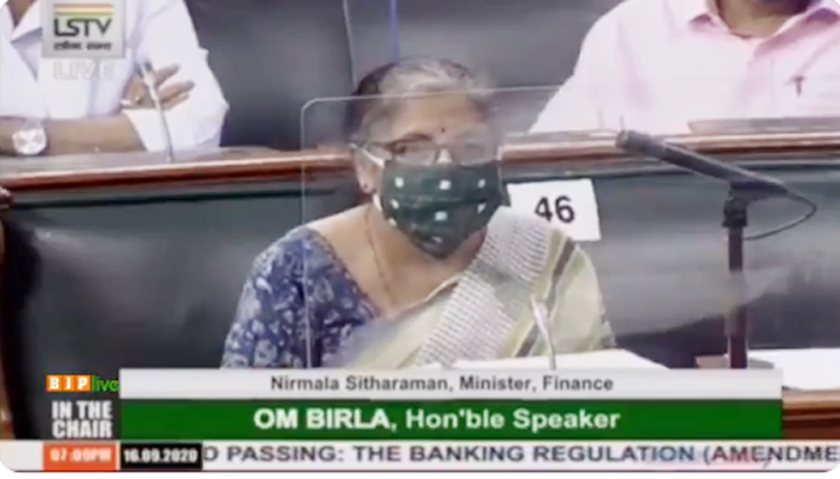Lok Sabha on Wednesday passed the Banking Regulation (Amendment) Bill, 2020, which proposes to amend the Banking Regulation Act, 1949. With this new Bill, the central government aims to bring cooperative banks under the supervision of the Reserve Bank of India (RBI).
Speaking on the occasion finance minister Nirmala Sitharaman said in Lok Sabha “We are trying to bring this amendment to protect the depositors. As in some unfortunate situation in banks, depositors are put to hardship”.
The Bill would be sent to Rajya Sabha and then would come back to Lok Sabha before being sent to acquire Presidential assent for it to become an Act. It bears recall that and left parties are opposed to the bill but being short on numbers they are not in a position to halt the march of the bill from becoming an Act.
Replying to the debate on the bill in the Lok Sabha, Finance Minister Nirmala Sitharaman said this legislation is for depositors’ safety and not for undermining powers of the Registrar of Cooperative Societies, reports PTI.
“I want to make it very clear that this bill does not provide for regulation of cooperative banks by the central government. We are not doing anything new, we are working in the interest of depositors,” she added.
Earlier, Finance Minister Nirmala Sitharaman moved a proposal in the Lok Sabha to withdraw the Bill introduced on March 3 during monsoon session as two bills on the same subject cannot co-exist. Plus, the revised bill also has some new features.
The RBI has been given power to implement the clause of moratorium on co-op banks, on the lines of Private and PSU banks. Now a distressed co-op bank can stop all public dealings till it is restructured and put back to sound financial health. The moratorium could be of varying length of time.
It was due to this provision that the Yes Bank could come back to normalcy when RBI could write off a large chunk of its bad loans. This provision would check a repeat of episodes seen in the case of many co-op banks including the PMC Bank, felt experts.
Also, the new Bill talks unequivocally of the Bill being applicable on DCCBs-which have been treated as personal fiefdom of ruling dispensation so far. Pawars and Mamatas are upset over this provision as they would no longer be able to use or misuse the DCCBs to suit their political agenda.
The revised Bill also allows RBI to approach High Courts and seek permission to go ahead with the restructuring of the co-op bank in question. They can write off loans, impose moratorium and even force merger of distressed banks—a big move to check the malaise of co-op banking, felt many experts.




